World Cup questions: why did gifted England not beat Argentina in 1998? | Barney Ronay | Football
History, Stephen said, is a nightmare from which I am trying to awake.
Back in the early days of the Covid-19 lockdown there was a tendency to talk, hopefully, about the many opportunities for self-improvement confinement would provide. One suggestion was that people would start reading James Joyce’s Ulysses, the most brilliant, and brilliantly difficult, novel of the 20th century.
So how did that work out? Anyone get past “fluttering his winglike hands, leaping nimbly, Mercury’s hat quivering in the fresh wind that bore back to them his brief birdsweet cries” before collapsing into the sofa cushions, overcome by the urge to read Tintin in America?
The big thing about Ulysses – other than being more difficult to engage with than, say, Friends – is that it’s about everything. Joyce presents the entire human condition in a stream of consciousness, the streets of Dublin as a microcosm of the universe.
Which is all very well, but after six weeks of brain freeze even glancing at its pages is likely to produce feelings similar to being stabbed through the eye with a knitting needle dipped in industrial glue.
No matter, though. It turns out there are less punishing ways to see a world in a grain of sand. You don’t need Ulysses to find a sense of deeper meaning in these sport-free times. Thankfully we also have the online Fifa World Cup archive, Saint‑Étienne 1998, and England versus Argentina.
What a game this was. Watching it back without the brainswipe of empire-sad Angledribble flagwave (cod-Joyce translation: “without watching it as a fan”) two things are immediately clear.
First, this is surely one of the great World Cup last-16 matches. And second, it feels as if it is something much bigger, an occasion that manages to tease an entire potted history of England-football-versus-the-world from a two-and-a-half-hour knockout game.
It’s all there in the details: from hope, to dashed hope, to celebrity obsession, to the tactical culture wars that circled English football through the 20th century. In its own way Saint‑Étienne is a kind of footballing Ulysses. Only a much easier one. With Michael Owen and Ariel Ortega in it. And with some really, really good goals.
It is also an uplifting occasion. It is tempting at times to view the entire backstory of England football’s engagements with the outside world as a place shrouded in pre-enlightenment gloom, inhabited by blockheads and blazered fools. But, of course, it wasn’t always like this.
Those years from Euro 96 to France 98 were a notably fun, frisky interlude, a time of progressive leadership under Terry Venables and Glenn Hoddle, staffed by a really fine crop of early Premiership players.
Hoddle’s squad for France 98 was drawn from 11 clubs. It contained 12 players with fewer than 20 caps, six aged 23 or under. His four strikers were Alan Shearer, Michael Owen, Teddy Sheringham and Les Ferdinand, which meant Hoddle could afford to omit two of the Premier League’s joint top-scorers that season, Dion Dublin and Chris Sutton (Owen being the third).
Also left out was Andy Cole, a hammer of the Champions League the following year. Robbie Fowler and Ian Wright were injured (Wright appears in the Fifa film wrapped in a flag in the stands). Matt Le Tissier and Stan Collymore had been tried and discarded.
This is a story of talent – England had a glut of it – and the way those small sporting variables, from elements of chance to mistakes magnified by pressure, end up framing the way the tale is told.
In the Fifa film Saint-Étienne looks beautiful as the teams walk out, a mix of lurid green and deep blue. England are in brilliant white. The hills in the background peep in over the lip of the stand. The equally beautiful David Beckham is also present, seen here in his pre-modern puppyish blond fop stage. The camera seems to swoon as it frames him in the centre circle, back-lit by the evening sun, a 23-year-old still at the start of his own extraordinary fast-forward trip through the popular culture.
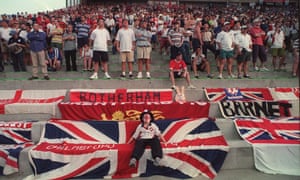
We get a pan of the England bench as the game kicks off: teenage Rio Ferdinand, eager-looking Gareth Southgate, Paul Merson japing and laughing. Unless specifically stated otherwise, it is safe to assume that during the hours that follow Merson is always japing and laughing, that this is a continuous state of being.
England lost to Romania in the group stage but progressed thanks to a 2-0 defeat of Colombia. Here they start in a 3-5-2 with Darren Anderton and Graeme Le Saux as wing-backs, and a central three of Paul Ince, Paul Scholes and Beckham. Sol Campbell, Tony Adams and Gary Neville is the back three. Shearer and Owen up front. This is a very good England team. It’s also a team packed with creativity; perhaps, as it turns out, recklessly so.
But then this was a World Cup stuffed full of brilliant footballers. The reward for victory in Saint-Étienne would be a quarter-final against the Netherlands (Bergkamp, Davids, Seedorf), who had beaten Yugoslavia (Mijatovic, Stojkovic, Savicevic) the night before in Toulouse.
Argentina were without Fernando Redondo, discarded by Daniel Passarella partly under the “no long hair” rule (also banned: homosexuality and earrings). But they came to the Stade Geoffroy-Guichard having beaten Japan, Jamaica and Croatia without conceding a goal, with Gabriel Batistuta already on four for the tournament, and with Ortega, Juan Verón, Javier Zanetti and Hernán Crespo to follow.
Ortega starts the game at the tip of a midfield diamond, with Claudio López close by as a roving No 10. From the early moments Argentina’s game is all depth and layers and short vertical passes, looking to find space between England’s more rigid lines.
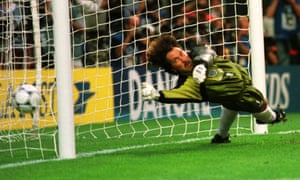
It’s a hard, fast opening, Beckham and Scholes pressing manically to fill the holes. Verón and Zanetti are striding about the pitch like a pair of polo‑playing dukes. Campbell intercepts at full stretch and you remember what a magnificently assured, pure defender he was even in those early years.
England should score two minutes in. Batistuta gives the ball to Owen, who turns and runs into space. The ball breaks. Le Saux drives in a low cross just too deep for Shearer’s lunge. For a few seconds the way Owen moved in that moment just sort of hangs there, like a glitch or a fluke. Did that really happen?
Then from nowhere Argentina have a penalty. David Seaman rushes out to intercept a diagonal pass. Diego Simeone nicks the ball away, waits for Seaman’s lunge, then falls over him. Adams does his bespoke double-handed diving gesture, but he’s wrong. This was just clever play. Seaman looks crestfallen.
Shearer makes a token effort to walk across Batistuta’s eyeline as he spots the kick, but the shot is low and hard enough to bounce in off Seaman’s hand. Argentina are 1-0 up with five minutes gone.
***
Beware the horns of a bull, the heels of the horse, and the smile of an Englishman.
England react like an England team react, running about with great energy, Ince snapping into challenges, Beckham trying to force the game. Almost immediately they find a way back, made by a poor pass from Verón. The ball bounces awkwardly, Verón and Nelson Vivas run forward into the same space. Scholes spots the mistake and heads the ball cleverly in behind them.
And there it is: Owen in open ground, apparently operating to an entirely separate set of physical rules. Roberto Ayala tries to intercept, arms behind him, but he looks terrified of this kid, this white-shirted blur. Owen goes down in the area. Penalty.
On the bench Hoddle leaps up and punches the air, splendidly turned out in a bright red polo shirt and baggy blue trousers. Simeone annoys Ince, stamping across the area as Shearer waits to take the kick.
Shearer doesn’t flinch. He smashes the ball past Carlos Roa and into the top corner, a nerveless, brilliant penalty kick. It’s 1-1 and for a moment the air looks too heavy to breathe. The England end is bouncing and tumbling, damp with sweat and evening dew.
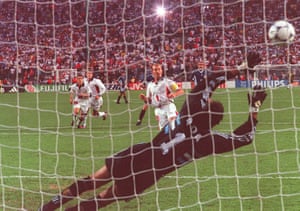
But nothing feels settled, and for a while Argentina just keep the ball, giving us a moment of familiar England tournament stasis, the white shirts chasing deep in their own half, unable to get anywhere near Ortega as he takes the ball on the half turn.
Paradoxically it is this period of possession, the white shirts shrinking back, that creates the outstanding moment of England’s World Cup. With 15 minutes gone Beckham takes the ball under pressure and plays an instant pass to Owen in the centre circle. He takes the ball with a bravura flick of the heel, already on the move. And he’s off now, heading towards his own little vision of the sublime.
Owen has at times seemed a remote figure in the years since. He has been accused of lacking a certain sense of wonder in his musings as a pundit. But imagine how it feels to have lived this sporting life. Owen has said he knew, or felt, or was told as a teenager that he was already the best player his age in the world.
It sounds an odd thing to say. But Owen is simply being honest. Aged 18 he saw the whole of the moon. At that moment, with José Chamot at his back and the World Cup bending to his will, Owen already knows what’s about to happen next.
He runs away from Chamot without breaking into a full sprint, keeping some gas for the next obstacle, which should be Ayala. Except Ayala is 30 metres away, back-pedalling in panic. Ayala! Come back!
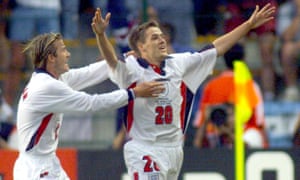
Owen veers to the right, the second phase of a run that is basically a giant Z from the radius of the centre circle. He doesn’t have to hurdle Ayala, who never even gets close. Scholes has appeared in Owen’s peripheral vision by now. He ignores him, takes three high-speed steps and spanks the ball past Roa’s arm and into the far top corner of the net.
It’s a moment of jaw-drop, of dead air. Owen runs past the Argentina end, arms wide, grabbing the night into his chest, cresting the perfect high. This is what he was born to do. Freeze that frame for ever.
***
We walk through meeting robbers, ghosts, giants, old men, young men, wives, widows, brothers-in-love, but always meeting ourselves.
Cut to the England bench and Merson is standing up shouting: “Whata farkin goal!” The England players hug Owen tenderly, reverently, as though aware of their own status as guests in this moment.
And once again we have an echo of The Whole Story, another of those Ulysses interludes. This isn’t just Peak Owen. It is arguably the greatest moment English football generated through the 1990s. Perhaps even, in the round, the best moment it has ever had.
Look at the evidence. Here is a teenage footballer of boundless possibilities, a snapshot in time ready to explode with wealth and promise. Zoom out and Owen in Saint-Étienne speaks to a domestic league in a state of voracious transformation, a nation entering its own plastic boom times, football poised to assail and overwhelm every other aspect of popular culture. Did it get any better than this?
All of which raises the more instant question. England are 2-1 up. They have a weapon Argentina can’t contain. They will end up playing 70 minutes with 10 men. But that should also be a stage for a player who is literally too fast, too direct to contain on the break. Why didn’t they win this game? Why didn’t they at least score another goal?
The obvious answer is that Argentina play Owen well from here. They do something un-English. Players begin to adapt mid-game, to read the situation. The blue shirts follow Owen when he comes deep, making him play facing his own goal.
When Owen does get the ball in space, around the half-hour, Chamot backs away just a little, keeping his body in line, forcing Owen to his left instead. From there the shot is scuffed wide. This is all information. We know your strength. Now we have a weaker side too.
By contrast Ince, Beckham and Scholes never really get to grips with Ortega, who is also playing brilliantly, slipping into awkward spaces, dribbling like a blue-shirted ghost. With 23 minutes gone Ortega runs across the midfield from left to right. Adams comes out to intercept but just goes sailing by like a steamship as Ortega slips the ball between his legs. No hard tactical response is offered to this threat. Adams and Campbell will simply defend heroically for the rest of this game. But they will always be playing to their limits.
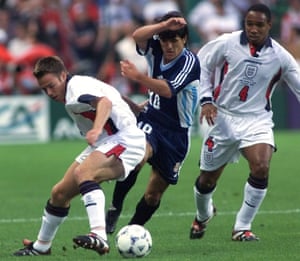
Another historic problem. For all their midfield talent England have nothing like Verón, a player happy to hold the ball, to rev or drop the throttle at any time. Instead England come at Argentina in square-drilled patterns and always at the same speed.
An essay could be written here on the misuse of Scholes, with an accompanying response on the over-egging of the alleged misuse of Scholes, a balm for every other falling-short. But you can see it in Saint-Étienne.
Scholes is trying to be three midfielders in one. He bombs forward, almost putting England 3-1 up, but screaming to himself as he watches his shot go wide. Scholes is also required to defend (there’s one full-bodied collision with Simeone: both men just get up and play on). He also has the Verón-style capacity to pass and keep the ball too, which he does, but not enough.
At times Scholes looks exhausted in that first half. Talent is being wasted in front of our eyes, overstretched by a confusion of roles.
Ortega, meanwhile, is free to float and create, and England are holding on as we enter stoppage time. Argentina are awarded a free‑kick. Batistuta shapes to shoot as he has once already. The wall creeps forward, a little comically, but leaving space behind it, into which Zanetti wanders untracked.
Verón’s nudged free-kick is perfectly weighted. Zanetti shoots powerfully into the top corner, a wonderful piece of improvised execution. And almost immediately the players are off. The score is 2-2. Argentina have been the better team. England have the tools to win this game, but the flow of their attacks has been disrupted.
Would a more ruthless, more experienced manager have replaced Beckham with David Batty at half‑time? England desperately need to shut down Ortega. Beckham is having a poor game. Verón is reading his angles, his habit of dropping off, spinning and playing diagonal passes.
Ince and Batty is a stronger shield in exactly the place England are being hurt. Later Argentina will play with two No 10s as Marcelo Gallardo comes on. Batty will come on and shut that space down effectively. This is all hindsight. But it is also there in the pattern of the game. Hoddle will have seen it.
Instead, we have The Event. Moments after the restart Beckham is off the field and Saint-Étienne is providing another big fat note, another wormhole into the complete Joycean history of modern-day England football.
Simeone fouls Beckham, going through the back of him just over the halfway line. He decides to get full value for the imminent yellow card, pressing down with his hand as he levers himself up. Beckham almost lets it go. Instead he kicks out. Simeone falls backwards.
Cue uproar from the blue shirts, and a moment of eerie calm as the Danish referee Kim Milton Nielsen walks around for a bit, then dolefully produces his red card. Beckham walks off without complaint.
The decision is entirely correct. Beckham has simply been outsmarted by the 28-year-old captain of Argentina, a player who has been in Europe for six years at three different clubs, who is an absolute hard-nosed warrior of this kind of thing.
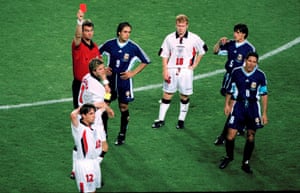
The subsequent response was, of course, hysterical but also telling. This was never an act of national betrayal, nor a sign of outrageous arrogance. No fatal flaw was exposed. Beckham made a mistake, but he was also young, handsome and an irresistibly snippable tall poppy.
The headlines, the effigy-hanging, the idea of some debt to the nation to discharge: this was in itself the problem, the cultural baggage, a shared confusion exposed by a moment of error.
It was also another major step on Beckham’s own journey into the cultural mainstream. No English footballer has ever leveraged his celebrity so effectively. But then, the world was still new in 1998, the stage still there to be grabbed, footballers still pop star-ish figures; or indeed still capable of finding this a worthwhile pursuit.
With Beckham the paradox remains that he was a very good, consistent footballer, and above all a hardworking and diligent pro, albeit one whose celebrity would continually intrude from the sidelines.
Can you feel it? We’re almost out of space. We’re only 50 minutes in here and the scale of the occasion is already expanding. There was still time for England to make what looks in retrospect like a tactical mistake, shifting to 4-4-1, with Owen, the obvious threat, shunted to the left wing.
In keeping with barrack room hierarchies, Shearer would remain the spearhead. He was still a wonderful player. He defended brilliantly. But he would spend the next 70 minutes wrestling with Chamot and Ayala, playing in their most comfortable spaces. The real cost of losing Beckham was losing Owen too.
The game is still frantic and breathless, but England have settled in for a heroically disciplined struggle to the line. Southgate comes on for the injured Le Saux, Merson for the exhausted Scholes. Owen finally gets the ball in a deep central area with 11 minutes left and is battered to the ground by Ayala.
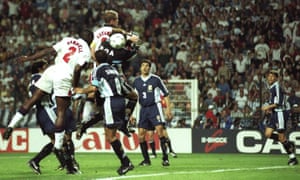
There is time for another weird interlude. Campbell heads Anderton’s corner into the net and runs off celebrating, unaware that Argentina are breaking downfield behind him, the goal having been ruled out – correctly – for Shearer’s foul on Roa. An underrated moment: the man making the tackle to block Crespo at the other end is Anderton himself, who has run back the length of the pitch, from corner-taker to last man.
***
Our national epic has yet to be written.
It is a gruelling denouement. The Beckham sending-off feels as if it was another world altogether by now. Ince has a wonderful half-hour of extra time, still running and dribbling and tackling.
Simeone comes off, injured and furious, but keeps popping back on in full kit during the breaks to scream at his teammates. Everyone is wide-eyed and glistening. Seaman’s hair has become a single majestically sculpted and sodden mass, the kind of hair it takes three hours in the stylist’s chair to attain.
At the final whistle you can feel where the shootout is heading. Argentina are the more technically accomplished team, penalties are the most basic test of skills under pressure. Roa is also worrying. His whole look is unconventional. He could be off to the skateboard park, or on his way to a modern art happening. This kind of goalkeeper is to be feared in a shootout.
Shearer spanks his kick hard down the middle, after Berti’s opener. Seaman saves from Crespo. Then: disaster. Ince takes exactly the same kick and Roa also saves.
Verón’s kick is a work of art but Merson puts his away easily. Gallardo makes it 3-2 but Owen takes a sensational penalty, then wheels away grinning. Where, exactly, has he been? Ayala puts Argentina 4-3 up and Batty has to score. It’s down the centre, straight on to Roa’s uplifted palm. Cue the pile-on of blue shirts, and last lines.
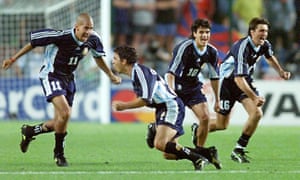
What to make of all this plenitude, this fecundity of themes and details? France 98 will be remembered by some as a waste of talent, an opportunity missed. This is the nature of all sport. There have to be losers. Accepting that fact has been a part of the national struggle.
But this was also a fine England team: progressively managed, crammed with talent, beaten on the details; and playing, as ever, with the feeling of ghosts on the pitch.
Looking back now there is a sense of joy in the whole occasion. And above all of wider meanings, of a story still in the process of being told.



